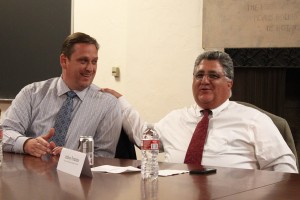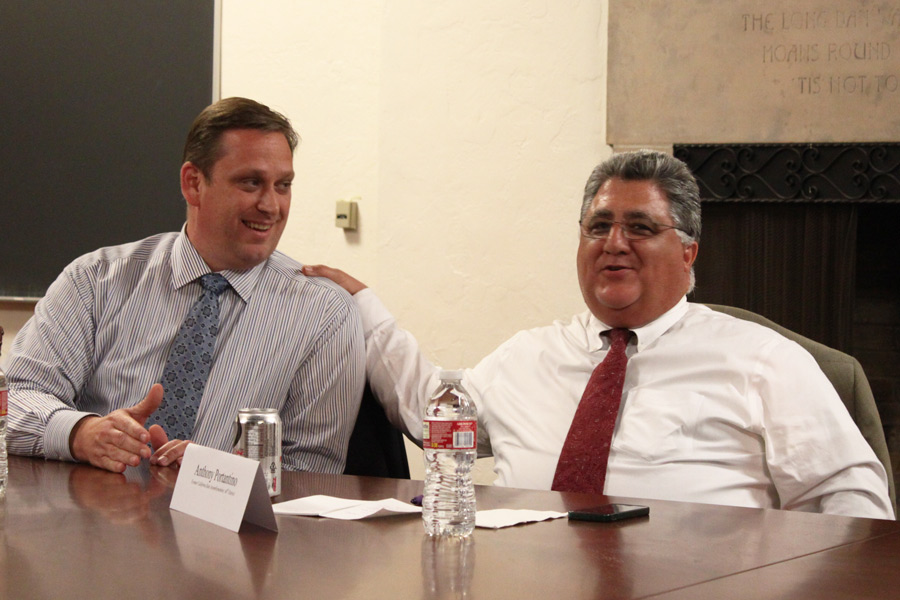PSA discusses California political policy
The Political Student Assembly and the Jesse M. Unruh Institute of Politics hosted a discussion focusing on Gov. Jerry Brown’s State of the State address, as well as the future of California policy.

Bear flag · Former State Sen. Tony Strickland (left) and former California assemblymember Anthony Portantino (right) shared their opinion on the future of California and Gov. Jerry Brown’s policies. – Jessica Zhou | Daily Trojan
Former California State Sen. Tony Strickland and former Assemblymember Anthony Portantino were in attendance, and praised Gov. Brown for his pragmatism in dealing with the state’s budget and other issues.
“Gov. Brown has established himself as an adult in the room, mainly by reigning in spending in Sacramento,” Portantino, a democrat, said. “He’s certainly keeping the left at bay, not a lot of new spending, not a lot of new taxes on top of Prop. 30 … I think he’s doing a very good job.”
Prop. 30 is a ballot measure passed by voters in Nov. 2012 that temporarily increased taxes to prevent a $6 billion cut in education funding.
Strickland, a republican and Congressional candidate, agreed that Gov. Brown was learning from the past and making prudent choices regarding the state’s financial future.
“[Gov. Brown] learned a lot from the mistakes of the past few governors,” Strickland said. “He hasn’t increased spending and he’s saved a lot of money for the rainy day fund.”
The talk then shifted toward policy prescriptions for California’s future. Strickland stressed the need for flatter tax rates and Portantino advocated for investment in education.
“What I think needs to happen is reform in the tax structure,” Strickland said. “We have these huge booms [in spending] when the economy is going well and then huge drops when it isn’t.”
Strickland also said that simplifying the tax code by eliminating confusing loopholes and deductions would create a more fair system in which the rich are not unfairly advantaged and everyone has “some skin in the game.” Doing so, he says, would prevent the boom-bust spending that is typical of California.
“You create this new program and tell voters, ‘Oh, enroll in this program’ and then two years later, you have to cut that same program,” Strickland said. “That’s not good policy.”
Portantino agreed that the polices of the late ’90s locked in spending at unsustainable levels, but he believes investment in education is key to restoring California’s prosperity.
“We’ve lost a lot of business because we’re not producing an educated workforce,” Portantino said. “We’re 3 million bachelor’s degrees short of meet the retiring generation.”
Portantino supported Gov. Brown’s decision to prioritize K-12 education.
“At a time when the economy demands we do more for our students, we are doing less,” he said.
The talk ended on a bipartisan note, with Strickland urging people to avoid obtaining information from only partisan sources.
“Elected officials are a snapshot of their electorate,” he said. “When people say they want compromise, what they’re really saying is they want you to agree with me.”
For many students the talk was informative and engaging.
“I agree that education reform is the most pressing issue facing California,” said Annie Wanless, a sophomore majoring in political science.“We have so many students who aren’t graduating.”
Others praised the bipartisanship.
“It was refreshing that a conservative republican was the one who said we needed to compromise,” said Luke Phillips, a sophomore majoring in international relations. “It’s always good to know that things are still civil.”

